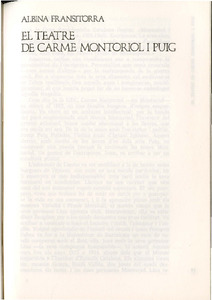El teatre de Carme Montoriol i Puig
Metadata
Show full item record
Estudis escènics: quaderns de l'Institut del Teatre. 1984, Núm. 25
Document typeArticle
Abstract
<p>Carme Montoriol Puig was born in Barcelona in 1893 and died there in 1966. A self-taught woman, she studied music and foreign languages. She acquired a thorough knowledge of French, Italian, German and English. From the latter language, she translated the complete sonnets of Shakespeare into Catalan, which she also handled perfectly, in their correlatively equivalent meter. She also translated plays by Shakespeare: <em>Cymbeline </em>and <em>Twelfth Night of What You Will, </em>both edited by Publicacions La Revista, and works by Pirandello, Barrie and Leona Stravis. In the field of narrative prose, she translated novels by Rudyard Kipling, Osear Wilde and Maurice Baring into Catalan, as well as <em>No pasarán </em>(story of the siege of Madrid) by Upton Sinclair. She wrote and published her own novels, <em>Terese, o la vida amorosa d'una dona </em>(Terese, or Laves of a Worman) and <em>Diumenge de julio[ </em>(Sunday in July). She was also prominent as a lecturer and devoted president of the Lyceum Club.</p>
<p>As a playwright she produced the following works: <em>L'abisme </em>(The Abyss) (1936), <em>L'huracà </em>(The Hurricane) (1935), <em>Avarícia </em>(Greed) (1936) and <em>Tempesta esvaïda </em>(Quelled Storm) (1956). The last of these was an operette with music by J Joaquim Serra. The first three belong to the realm of bourgeois drama. They are realistic works with one foot on the threshold of naturalism. One decognizes the influence of Ibsen, whose works she knew well. The theories of Freud also run through the works, especially <em>L'huracà </em>(The Hurricane). This work was received as scandalous by the society of her day, because it dealt with the theme of son in love with mother/woman. The critics vehemently disagreed, some in favor of her, some against her, but they all had to admit that this work, like the other two, possessed unquestionable literary merit.</p>
<p>In 1939 she went into exile, but soon returned homesick to Catalonia; notwithstanding, her pen, like that of many other writers of her time, remained inactive for the rest of her life.</p>
Access conditionsOpen Access
ISSN2385-362X
,
0212-3819
Collections
- 1984: Núm.: 25 [6]


